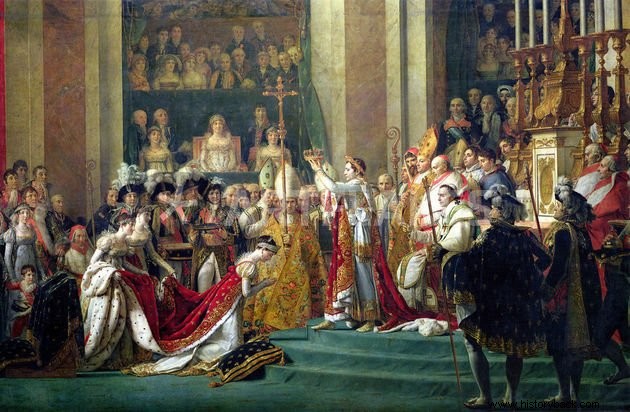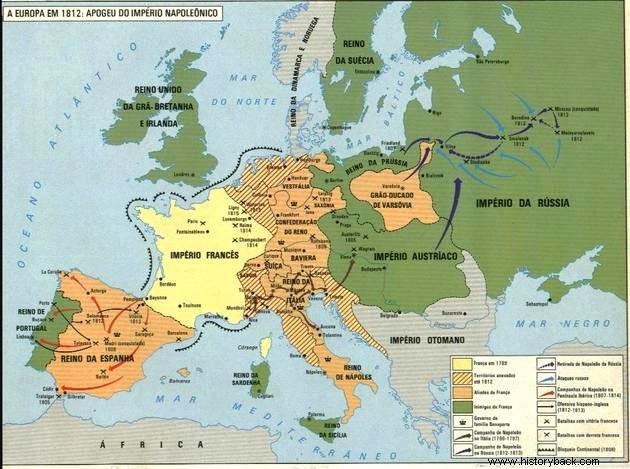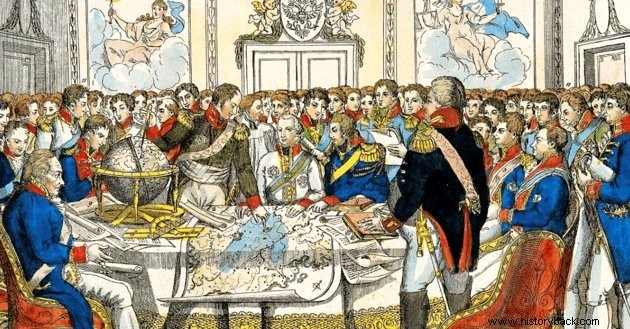The Napoleonic Empire began on May 18, 1804 and ended on April 14, 1814.
This form of government was instituted after the appointment of Napoleon Bonaparte as Emperor of the French. On November 6, 1804, the title would be confirmed through a plebiscite.
On December 2 of the same year, Napoleon Bonaparte was crowned Emperor in a ceremony at Notre-Dame Cathedral in Paris, where Pope Pius VII was present.
Among the achievements of the First French Empire is the expansion of territory and liberal ideas.
Formation of the Napoleonic Empire
The Empire was the height of the career of the young general Napoleon Bonaparte.
He distinguished himself in defending France from the attacks of the nations that invaded in retaliation for the revolution and the condemnation of Louis XVI (1754-1793).
Therefore, Bonaparte had secured the support of the army and gave the Coup of the 18th Brumaire that allowed him to rule France as Consul. Although the government was shared with two other people, their thirst for power neutralized the action of the comrades.
The Empire also represented a way of maintaining the bourgeoisie's conquests after the revolution and guaranteeing popular sovereignty.

The title of Emperor was granted to Napoleon by the French Senate on May 18, 1804 and later ratified by a plebiscite in November of the same year.
The government, however, was not absolutist but constitutional, as the emperor was obliged to swear respect to the Magna Carta.
In order to obtain more legitimacy for his reign, Bonaparte marries in 1810 Maria Louise of Austria, daughter of Emperor Francis I of Austria and sister of the future Empress Leopoldine.
In this way, imperial continuity would be maintained by Napoleon's descent through his male son.
After his coronation, Napoleon Bonaparte prepared to expand his domains throughout Europe and face his main enemy:Great Britain.
See also:Coup of the 18th BrumaireExpansion of the Napoleonic Empire
Bonaparte decides to attack Great Britain by sea, but is defeated at the Battle of Trafalgar in 1805.
With this, Napoleon realizes that he would only be able to invade the country through economic strangulation and, for this reason, he decrees the Continental Blockade, in 1806
This consisted of banning all European countries from trading with the United Kingdom. Anyone who disobeyed would be invaded by the French army.
Several countries refused to comply with this order, such as Portugal and the Russian Empire. In retaliation, Bonaparte declared war on these countries.
The Continental Blockade became ineffective in the face of smuggling carried out with the consent of the British fleet. This one guaranteed trade between its American colonies and even supported countries like Portugal.
This fact directly influenced the history of Brazil, because in the face of the French invasion, Dom João transferred the Portuguese court to Rio de Janeiro.
Check out on the map below the territories occupied by the Napoleonic Empire in Europe:

Once the opposing army was defeated, Napoleon Bonaparte handed over the government of the territory to his brothers. Likewise, he took the opportunity to marry his sisters to generals of his trust and put them to administer in his name.
In the first case we have his brother José Bonaparte who was declared King of Naples (1806-1808) and later King of Spain (1808-1813); Louis Bonaparte, proclaimed King of Holland (1806-1808) and Jerome Bonaparte, reigned over Westphalia (a territory in present-day Germany) from 1807 to 1813.
Napoleon's sisters were also awarded possessions:Elisa Bonaparte was Grand Duchess of Tuscany (1809-1814), Paulina Bonaparte was Princess and Duchess of Guastalla and Carolina Bonaparte, Queen of Naples from 1808.
Revolutionary ideals were spread in these countries and served as a basis for guaranteeing individual rights.
See also:Napoleonic WarsEnd of the Napoleonic Empire
The expansion of the Napoleonic empire, however, encountered strong resistance from the Russians and Napoleon was defeated at the gates of Moscow in 1812.
The Emperor of the French was unable to contain the rebellions that sprang up in different parts of his domain. Thus, on April 6, 1814, Bonaparte abdicates the throne.
He goes to the island of Elba, off the Italian coast, but quickly manages to escape and return to France leading a large army.
However, he suffers the final defeat at the Battle of Waterloo in June 1815, being arrested and exiled to the island of Saint Helena, an English possession.
See also:The Battle of WaterlooConsequences of the Napoleonic Empire
The Napoleonic Empire left a legacy in France and Europe.
In France, the institutions already established during the Consulate were consolidated:public education, Bank of France, Civil Code and the Commercial Code. Likewise, the country was territorially divided into departments.
In turn, in Europe, the Napoleonic wars put an end to the Holy Roman Empire, brought about the end of feudalism and contributed to the birth of nationalism in regions such as Belgium, Italy and Germany. These would emerge as independent countries throughout the 19th century.
For Portugal, it provoked the invasion of the country by the French and the consequent transfer of the Court to Brazil. Liberal ideas would directly influence the Porto Revolution of 1820.
See also:The Coming of the Royal Family to BrazilCongress of Vienna and the End of the Napoleonic Empire

After Napoleon's defeat, European nations gathered in the city of Vienna. The objective was to re-establish the Old Regime and the new European borders, in accordance with the wishes of Great Britain, Austria, Prussia and Russia. These nations made a pact known as the Holy Alliance.
The encounter began in 1814, after the Battle of Leipzig, but was interrupted with the return of Napoleon to France.
This period would be known as the Government of the Hundred Days and Bonaparte would organize his last war offensive in the Battle of Waterloo, in 1815.
See also:Napoleonic eraMonarchical Restoration
The nations that defeated France restored the ancient monarchies that were overthrown during the Napoleonic expansion.
In Spain, Fernando VII reigns again; the Orange-Nassau dynasty returns to the Netherlands and France itself begins the reign of Louis XVIII.
Despite the triumph of conservatism over liberalism, Europe would be rocked by a series of bourgeois revolutions in the following years.
See also:Congress of Vienna (1814-1815)Continue to study the subject:
- French Revolution
- Fall of the Bastille (1789)
- The Terror in the French Revolution
